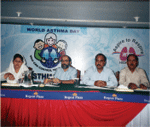
World Asthma Day Seminar
Pakistan Chest Society in collaboration with Highnoon Laboratories arranged a Seminar and Patient Awareness Program to observe World Asthma Day on May 9, 2009 at a hotel in Karachi.
Prof. Nadeem Rizvi, Head Department of Chest Medicine Jinnah Postgraduate Medical Centre on the occasion said that more than 300 million people around the world have asthma, and the disease imposes a heavy burden on individuals, families, and society.
He further emphasizes that effective asthma treatments exist and with proper diagnosis, education and treatment, the great majority of asthma patients can achieve and maintain good control of their disease. When asthma is under control, patients can live full and active lives. However one of the reasons this goal is not achieved is the non affordability of drugs increased attention to asthma in children. Asthma often develops during child hood, and is the chronic disease most commonly causing absence from school. “Despite asthma’s importance as a very common childhood disease, there are many gaps in our knowledge of how to diagnose and manage asthma in children.
Dr. Faizullah Shafquat of Ojha Institute of Chest Diseases said that treatment of asthma should be consistent with evidence-based guide-lines. The aim of the treatment should be to control quality of life of asthma patient. Patients are managed in stepwise manner. Usually attack of asthma is managed well but we fail to control further attack because of irregular use of controllers. The use of inhaled glucocorticosteroids for long-term management of asthma can diminish chronic inflammation in the lungs of asthma patients, and are a key to controlling the disease.
Dr. Tajamul Baig of Civil Hospital Karachi said that often eatable like rice, banana and milk are blamed for asthma attack which usually is not the case. Similarly there are lots of reservations about using inhaler. They are the first medicine not the last.
Dr. Ali Zubairi of Aga Khan Hospital talking about management of acute severe asthma said that about 50 percent asthmatic need hospital care for asthma and life threatening conditions can arise during severe attacks. Patients can some time require ICU care. Soin case of acute severe asthma patient should see the specialist care.
Earlier, Dr. Imran Suleman, Product Manager, Highnoon Laboratories offered vote of thanks.
Later on, Patients Awareness Program was held in which Dr. Mohammed Hussain of Liaquat National Hospital replying to the queries of the questionnaire said that in many regions of the world, people with asthma are exposed to conditions such as outdoor or indoor air pollution, cigarette smoke, or chemicals on the job that make their asthma worse. In some patients viral infections can trigger an attack. Some victims sense an attack coming after any form of physical activity, called as exercise induced asthma. Avoiding risk factors that cause asthma symptoms is an important strategy for improving control.
Dr. Zafaryab Hussain of Kulsoon Bai Valika Hospital said the exposure to work place pollutants can trigger an attack of asthma in hyperresponsive individual. He recommended that every effort should be made to follow international standard to keep the dust level to the minimum Dr. Shahina Qayyum General Secretary Pakistan chest society Sindh talking about asthma in pregnancy said that asthma is the most common non infectious disorder of respiratory disorder which usually occurs after first trimester. It should be managed promptly like any other patients. No harmful effect has been reported with common drugs used in asthma that include inhaler. If acute severe asthma is not managed the hazard of low oxygen delivery to the baby. Asthma is non contagious so mothers can breast feed their babies.
